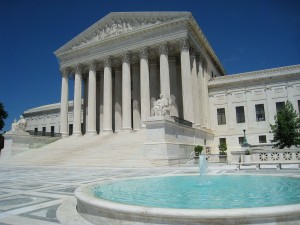Why Employ a Federal Crime Attorney: Safeguard Your Rights with Expert Legal Aid
Why Employ a Federal Crime Attorney: Safeguard Your Rights with Expert Legal Aid
Blog Article
Debunking the Process of Federal Appeals: What You Required to Know
Browsing the complex world of government allures can frequently look like traversing uncharted waters for those not familiar with the process. Understanding the nuances of appellate court jurisdiction, the intricacies of filing a notice of charm, providing a compelling brief, and making a persuasive oral argument are vital components that can significantly influence the end result of an instance. By untangling the layers of intricacy bordering federal appeals, individuals can obtain a more clear understanding into the mechanisms that govern this critical phase of the lawful system.
Comprehending Federal Appeals Process
Looking into the detailed world of the federal appeals procedure reveals a structured and methodical journey through the judicial system - utah federal crime appeals lawyers. Federal appeals act as an essential device for evaluating choices made by reduced courts. Comprehending this procedure is important for any person involved in lawful process at the federal degree
The procedure generally starts with an event dissatisfied with a reduced court's judgment filing a notice of allure. This triggers an evaluation by a greater court, where a panel of courts evaluates the legal debates presented by both celebrations. Briefs detailing the lawful reasoning behind each celebration's setting are submitted, and dental arguments might be heard to clear up complicated concerns.
The appellate court's decision is based on a complete exam of the lower court's proceedings and the disagreements offered. The courts do not focus however reexamine realities on whether lawful errors took place that impacted the reduced court's choice. Once the appellate court reaches a decision, it can verify, turn around, remand, or change the reduced court's judgment, giving quality and finality to the lawful disagreement. Understanding this procedure is crucial for navigating the complexities of federal charms properly.
Appellate Court Territory Clarified

Appellate courts have jurisdiction over certain sorts of instances, generally those including legal errors, procedural problems, or concerns of regulation instead than valid disagreements. The territory of appellate courts is generally outlined in statutes and laws that govern the court system. Comprehending appellate court jurisdiction is important for celebrations included in the charms process as it figures out whether a situation is eligible for testimonial and the extent to which the appellate court can intervene in the lower court's decision.
Filing a Notice of Allure
The first action in starting the government charms process involves filing a Notification of Allure with the ideal appellate court. best massachusetts federal appeals attorneys. This crucial paper formally alerts the court and the other events associated with the instance that the appealing party plans to seek a testimonial of the lower court's choice. Filing a Notification of Appeal is a rigorous procedural demand that sets the appellate process moving
When preparing the Notice of Allure, it is vital to ensure compliance with the details guidelines and standards of the relevant appellate court. The paper must generally consist of information such as the instance name, the lower court's name, the day of the judgment being appealed, and a concise statement showing the grounds for the charm.
Timeliness is essential when filing a Notice of Allure. Missing the due date for sending this paper can cause the allure being disregarded, emphasizing the relevance of precise and punctual initiation of the appeals process. It is a good idea to look for legal support to browse the complexities of submitting a Notification of Charm successfully.
Rundown and Oral Debate
In the appellate process, offering written briefs and taking part in oral arguments play pivotal functions in advocating for the appealing celebration's position before the appellate court. Briefs are thorough legal records that outline the parties' disagreements, lawful authorities, and evaluation sustaining their placements. These created submissions provide the court with an in-depth understanding of the realities of the instance, the pertinent legislation, and why the appealing party believes the lower court's decision should be overturned.
Adhering to the submission and testimonial of the briefs, dental debates supply the events a possibility to additional clarify their settings, attend to any type of concerns the appellate judges may have, and emphasize vital factors from their created briefs. Dental disagreements are a possibility for the attorneys to persuade the judges through spoken campaigning for and feedbacks to questions from the bench.

Receiving the Appellate Court Choice

Final Thought
Finally, the government appeals procedure is a complicated but critical action in looking for justice. Comprehending the appellate court jurisdiction, submitting a notification of allure, preparing briefs, and offering oral arguments are all vital parts of this process. Inevitably, obtaining the appellate court decision can give clarity and resolution to legal conflicts. It is very important to browse the government allures procedure with diligence and interest to information to accomplish a reasonable outcome.
As we proceed from understanding the government allures process to exploring the details of appellate court jurisdiction, an essential facet comes to light regarding the authority and limitations of these greater courts in the lawful landscape. Appellate court jurisdiction refers to the range of instances that a particular appellate court has the power to decide and evaluate upon. Unlike trial courts that hear situations for the very first time, appellate courts are limited to evaluating decisions made by lower courts. Understanding appellate court jurisdiction is essential for celebrations included in the allures procedure as it determines whether a case is eligible for evaluation and the degree to which the appellate court can interfere in the reduced court's choice.
Whether the appellate court affirms, reverses, or remands the lower court's choice, recognizing the ramifications of the ruling is essential for all parties entailed in the appellate procedure.
Report this page